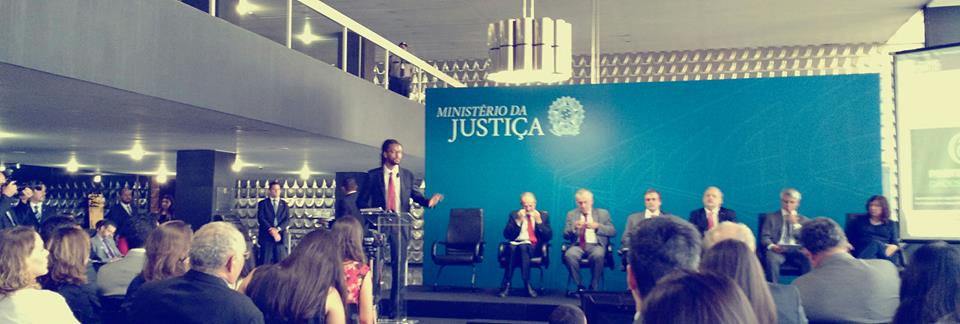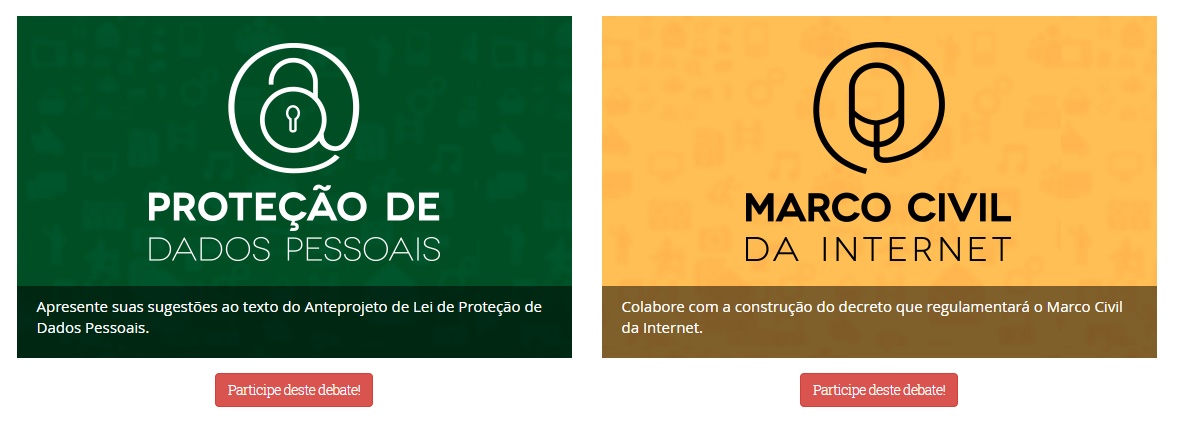
InternetLab Reports – Public Consultations No. 01
Last Wednesday (January 28) the public debates on the regulation of Civil Marco Internet and on the Data Protection Draft Bill were launched. By collecting comments and arguments posted on the government online platforms, the Brazilian Ministry of Justice plans to elaborate two different legal texts: (i) a decree specifying general points of the “Marco Civil da Internet” and (ii) a draft for a data protection bill that should be sent to National Congress.
Getting Started – How to participate?
The platform created for the public consultations is quite easy to use. Signing up is quick and simple (the only requirement is a valid email address). See below the homepage of the Ministry of Justice website, showing the paths to follow both debates.

No personal ID is needed to participate. All participants are identified only by a “username” and an email address. Regardless of the authors of the comments, the idea is to collect good and deep arguments of the concerning topics. Appeal to authority won’t work, for example.
The aim of the consultations is quality, not quantity. The number of participants who engage in favor or against an opinion doesn’t matter; what matters is the content of the suggestions. According to the Ministry of Justice, the consultations are not a “referendum”. The number of contributions won’t be decisive in the consolidation of the results.
Is that a problem? Not necessarily. Models of participation that only focus on quantity could bring too much complexity (such as authentication mechanisms and protection softwares against platform manipulation devices or programs) and could conflict with legal-production activities of authorities elected by popular vote (Executive and Legislative powers). The plan is not to provide for a substitution or delegation of these powers. Instead, the goal is to open channels for participation and thereby inform the policymaker’s decision. The idea is not to substitute votes for “likes”, but to collect good arguments and engage new technologies on traditional decision-making structures.
Two public consultations, two dynamics
For the public consultation for the regulation of Marco Civil da Internet, participation is divided in four “main topics“: net neutrality“, “privacy” (restrictions on personal data collection and law enforcement), “connection and application logs” (definitions on how Internet users’ footprints can be stored and delivered to research or third parties authorities) and “other issues and considerations” (as the government’s stance and its public policies for Internet development). Within each of these topics, any participant is free to create subtopics and comments. There are introduction notes to each of the main topics, aiming to clarify the context before users post.
In the Data Protection Draft Bill, comments are inserted directly on the draft, i.e., participants can comment on each article, paragraph and item. Also in this case, the platform offers a division into “main topics“, but now merely for organizational purposes, serving only to organize and facilitate the visualization of topics.
The products of each of the consultations are different. The regulation of the Civil Marco will be made by decree, the Personal Data Protection discussion will lead to a draft bill. The suggestions made in each case should then have different concerns.
The regulatory decree can only be created by the president (as of the Brazilian Constitution, in Article 84, section IV) and has an inferior a status in relation to laws enacted by Congress. Decrees such as this serve to specify topics of a law and determine details on how best to enforce it. This means that its provisions must always be limited by the frame of the law.
The “Marco Civil da Internet” (Law 12,965 /14) has already been through all the procedures of the legislative process – it was enacted and is already a law. This new open consultation aims to precisely regulate the law, that is, to translate its rules into more specific provisions. Therefore, it makes no sense to use the platform in order to propose changes in the text of the Marco Civil da Internet, because it has already been approved.
In the case of the consultation on Data Protection, a draft bill is the previous stage of a bill, what means that it hasn’t reached the Legislature yet. Therefore, participants are free to express their opinion on how the law should be, not being tied to previously elaborated text.
Debates: what is happening inside the platform?
Within just one day from the launch of the open consultation, the issue of net neutrality has already gathered several contributions. Network neutrality is a rule that prohibits unequal treatment of data packets which travel over the network.
An important contribution was the one made by “hmaziviero”: she pointed out the need to define more clearly the terms “essential technical requirements” and “emergency services” present in the legal text, in its Article 9. These are the possible exceptions to the rule of net neutrality. The concern, shared by other users, is that these terms are used abusively by the Internet service providers (ie, people who control cables and infrastructure).
Still relating to net neutrality, an important contribution made involves “free services offered by mobile connection providers”. The creator of the topic, Sergio Denicoli, believes that this type of plan (called “zero rating”) is a breach of net neutrality. Last week, InternetLab’s blog in “Link Estadão” addressed this topic:
As much as zero rating plans may promote access to specific services, they are far from representing an adequate form of promoting universal Internet access, strengthening social stratification, and dividing the Internet experience among those who can afford it and those who cannot.
Authors: Francisco Brito Cruz and Jonas Coelho Marchezan.